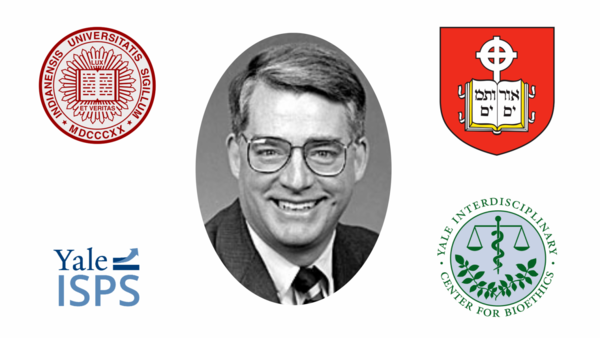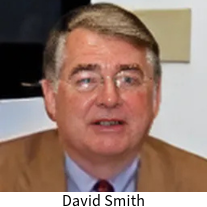Remembering David Smith: Pioneer of Yale’s Interdisciplinary Center for Bioethics

As an undergraduate student at Yale, Carleen Zubrzycki felt lucky to have signed up for an introductory bioethics class taught by David Smith.
“There was something so grounded and real about what Professor Smith was talking about,” said Zubrzycki, now an associate professor of law at the University of Connecticut. “He had a real insistence that human flourishing and how humans find actual meaning in life were the lodestars of ethical analysis. He wasn’t interested in simple answers. He took students very seriously. He was a listener, a supporter. He was just a gem.”
David Smith died in his sleep on Oct. 5 at the age of 85.
A leading scholar of religion and bioethics, Smith earned a bachelor’s degree from Carleton College in 1961 and another from Yale Divinity School in 1964 before earning a Ph.D. from Princeton University. He served as chair of Indiana University’s Department of Religious Studies and director of the school’s Poynter Center for the Study of Ethics and American Institutions.
From 2007 to 2011, he served as the first director of Yale’s Interdisciplinary Center for Bioethics, shepherding what had been a loosely organized program at the Institution for Social and Policy Studies (ISPS) into a structured, vibrant center that continues to thrive with support from ISPS.
“We still enjoy the fruits of his efforts and will continue to do so for decades to come,” said ISPS Director Alan Gerber, Sterling Professor of Political Science. “We are grateful for his leadership, his passion for the study and discussion of ethical issues in science, and his legacy among the many colleagues and students he inspired.”
Before Smith arrived at Yale, the bioethics program was overseen by Margaret Farley, Gilbert L. Stark Professor Emerita of Christian Ethics, and Robert Levine, professor emeritus of internal medicine, who died in 2021. Smith led the transition into a more formal organization, solidifying relationships with affiliated faculty members, inviting internationally known scholars to speak at the center, and accelerating the completion of research projects.
Early in his tenure, Smith hired Stephen Latham, who eventually replaced him as director.
“David established the first regular presence on the campus for bioethics teaching,” Latham said, noting that an earlier, popular course featured different speakers each week and was no longer taught when Smith arrived. “But now, thanks to David, we have continuous education in bioethics available to undergrads that wasn’t available before.”
In addition, Smith seized an opportunity to expand a small program for student resident advisors working on projects and listening to occasional speakers over the summer. He established admissions for non-Yale students and helped construct a formal curriculum. This program, initially overseen by Carol Pollard and now by Lori Bruce, grew into the Sherwin B. Nuland Summer Institute in Bioethics, which every year invites people to Yale from around the world, across different fields, and at various career levels for seven weeks of instruction. Recent classes include students from more than 20 countries, including Afghanistan, Singapore, India, and Brazil.
“This is one of our signature programs now,” Latham said. “David was the inventor. It was his idea to run it as a program available at Yale for outside students.”
When colleagues asked Dr. Mark Mercurio, professor of pediatrics, to lead an effort to establish an ethics program at Yale Medical School, Smith came with him to meet the dean.
“He was extremely supportive and I’m sure instrumental in making it happen,” said Mercurio, who now helms the school’s Program for Biomedical Ethics. “He was very much an older brother to me in this enterprise. I miss him very much.”
Mercurio, like so many others, recalled not just Smith’s leadership and intellect but his joy, humor, and modesty.
“He was a very humble guy, quicker to smile than most, and so welcoming,” Mercurio said. “He never wanted to tell you how smart he was. He wanted to bring people in and let them shine.”
Mercurio remembered Smith inviting him to attend lunches with well-known visiting scholars.
“These were giants in the field,” he said. “I was like a rookie that got to hang out with Babe Ruth and Lou Gehrig. It wasn’t lost on my what a real privilege it was. But David never let you think you were the rookie and he was the star.”
Donald Green, former director of ISPS and now Burgess Professor of Political Science at Columbia University, recalled Smith’s gracious nature and infectious spirit.
“David was smart and knowledgeable but also thoughtful and analytical, as a bioethicist needs to be,” Green said. “He was certainly attentive to the philosophical nuances of serious life-and-death issues. But in a heartfelt way. Serious, but buoyant.”
Green appreciated his upbeat demeanor, warm smile, and a temperament he traced to his upbringing in Evanston, Ill., his college years in Minnesota, and much of his life spent in Indiana.
“He had that old-style Midwestern charm,” he said. “A straightlaced guy who enjoyed a good joke.”
Florence McBride, a Carleton classmate and friend of Smith’s wife, Marie-Louise Smith, has fond memories of the couple. She and her husband, Michael McBride, professor emeritus of chemistry at Yale, saw them at Carleton reunions in Minnesota, in New Haven, and later at the Smiths’ home in Bloomington, Ind.
“David was one of the most interesting and charming people I’ve ever met, with a delightful sense of humor,” McBride said, noting how tenderly he cared for his wife, known as Weezie, as she suffered from the symptoms of Parkinson’s disease in the years before her death in 2021. “It was wonderful to see the way he interacted with her and worked with her. He was so loving and so helpful in a low-key way.”
Zubrzycki, who graduated from Yale Law School and Yale College, credits Smith for going out of his way to mentor her and inspire her passion for exploring legal issues in health care.
“There was something special about the way he made me feel like I was good at this,” she said. “I think about him when I am teaching.”
Mercurio said among his favorite memories of Smith was a conversation they had with Latham at the center’s office.
“Just the three of us talking about the future of the center, about bioethics, about the nature of things,” he said. “It was something about the tone that he set, his great moral compass and insight. He was just an absolute pleasure to be around.”
He said that although Smith was only at Yale for a few years, his contributions to the field of bioethics, to Yale, and to those he touched, would last much longer.
“He was a very special man,” Mercurio said. “Time spent with David was time well spent.”